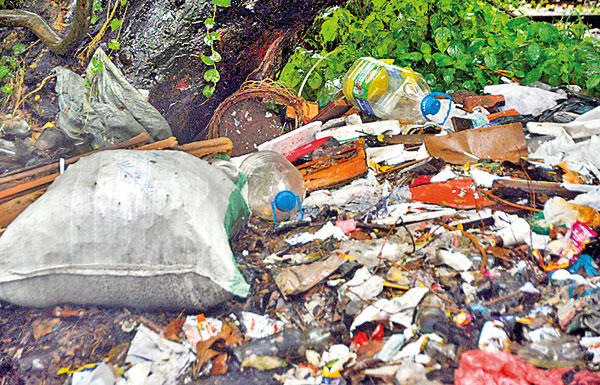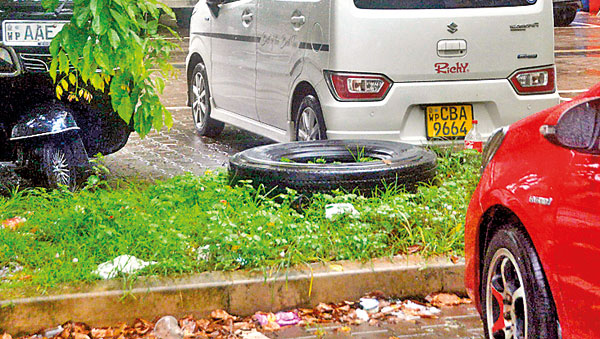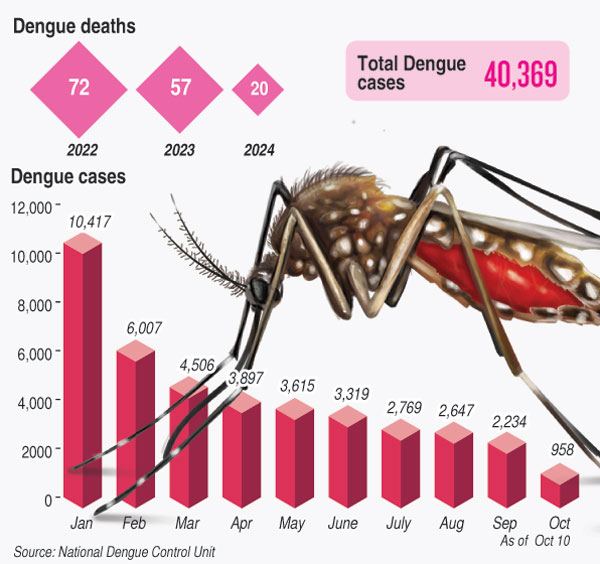News
40,369 dengue patients raise fears of more infections
View(s):By Nathara Abeywickrema
The National Dengue Control Unit (NDCU) of the Ministry of Health has warned of a potential increase in dengue cases in the coming weeks, citing reduced public vigilance in dengue prevention. This concern is heightened by the rains, which create favourable conditions for mosquito breeding.
As of October, Sri Lanka has reported 40,369 dengue patients, with 958 recorded in just the second week of the month. Several regions are seeing greater rates of transmission, according to NDCU Consultant Community Physician Dr. Nimalka Pannila Hetti.
The Western Province, including the Colombo District, has been particularly hard-hit, with 10,110 patients. Other areas are also facing significant outbreaks, including Gampaha with 4,744, Kalutara with 2,243, and Jaffna reporting 4,113, raising serious public health concerns, Dr. Pannila Hetti said.


With heavy rains in the past few days these are potential mosquito breeding grounds. Pix by Nilan Maligaspe
NDCU Director Dr. Sudath Samaraweera said that the surge in dengue cases is caused by the development of atmospheric disturbances near Sri Lanka and the monsoon conditions, which bring heavy rainfall and create ideal breeding conditions for Aedes mosquitoes, the main carriers of the virus. However, he assured that the situation remains under control.
In the 40th week, 663 suspected dengue cases were reported across 25 districts, reflecting a 6.3% increase compared with 624 cases in 23 districts during the 39th week, he said.
However, NDCU is gearing up to address potential dengue outbreaks in the North-East, which typically arise from November to February. Dr. Samaraweera announced that special dengue prevention programs will take place from October 24 to 26, focussing on 28 MOH areas in the Northern and Eastern provinces. The initiative will kick off in Batticaloa, Kalmunai, and Trincomalee in the Eastern Province.
According to Dr. Yudhisteera Wedisinghe, medical officer for vector-borne disease control of the Western Province, the province has reported the highest number of dengue cases due to its dense population, rapid urbanisation, and high level of construction activity.
Additionally, improper waste disposal in both residential and commercial areas has worsened the problem by creating more environments where mosquitoes can thrive. The wet weather and intermittent rainfall also play a significant role in sustaining these breeding grounds, said Dr. Wedisinghe.
Dengue, transmitted by the Aedes aegypti mosquito, thrives in both urban and suburban settings.
Bringing the outbreak under control requires an integrated approach, combining government action, public participation, and expert-driven strategies.
Medical Officer of Health attached to the NDCU Dr. Indralingam, highlights that prevention is the most effective way to curb dengue. He emphasises the need for source reduction: “We must target mosquito breeding grounds, which are mainly created by stagnant water around homes, construction sites, and poorly managed waste disposal areas. Without eliminating these, the Aedes population will continue to rise, especially during monsoon seasons.”
In suburban areas, where construction activity is common, stagnant water tends to accumulate in discarded containers, tires, and uncovered tanks, Medical Officer of Health at the NDCU Dr. Lahiru Kodithuwakku said.
Experts recommend regular clean-up campaigns involving local communities and the government to identify and eliminate potential breeding grounds. Schools, workplaces, and residential areas should be monitored.

Another critical measure is fogging and the use of larvicides in high-risk areas. But these methods only provide temporary relief. “Fogging kills adult mosquitoes, but it does not affect the larvae, which is why it must be supplemented with long-term strategies such as the proper disposal of waste and the use of larvicides,” said Dr. Kodithuwakku.
He mentioned that continuous fogging without addressing breeding sites often leads to resistance in mosquito populations, making the problem worse in the long run.
Doctors recommend seeking immediate medical attention if one suspects dengue, with symptoms including fever, headache, or joint pain. Paracetamol (acetaminophen) is recommended for treating pain and fever, but doctors advise against using aspirin, ibuprofen or other salicylates, and nonsteroidal anti-inflammatory drugs (NSAIDs).
Dr. Kodithuwakku advises people to stay hydrated, rest, and use mosquito repellent or a net to stop the spread of the virus. Early diagnosis and proper medical care can help manage symptoms and prevent severe complications.
PHI union secretary, Shanaka Bopitiyage said that in the suburbs, residents may not be fully aware of the consequences of leaving standing water unchecked.
PHI Bopitiyage said: “Community involvement is crucial. Households must take responsibility for keeping their immediate surroundings clean, and schools should incorporate dengue prevention education in their curriculum to raise awareness.’’
Moreover, in suburban areas, there is often a gap between municipal resources and community needs, particularly when it comes to waste collection. Delays in garbage removal can quickly create mosquito-breeding environments. Strengthening municipal waste management systems, particularly in suburbs, is a critical step in controlling the spread of dengue.
Experts recommend increasing the frequency of waste collection during peak mosquito breeding seasons and ensuring that all households have access to proper disposal methods.
PHI Bopitiyage emphasised the critical role of government enforcement in regulating construction sites and public spaces while highlighting the need for health officials to continue monitoring and responding to outbreaks.
Meanwhile, at the community level, awareness campaigns and clean-ups are essential for prevention.
The best way to say that you found the home of your dreams is by finding it on Hitad.lk. We have listings for apartments for sale or rent in Sri Lanka, no matter what locale you're looking for! Whether you live in Colombo, Galle, Kandy, Matara, Jaffna and more - we've got them all!

